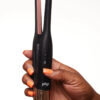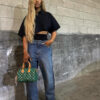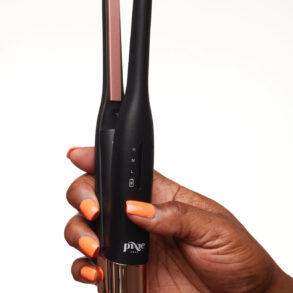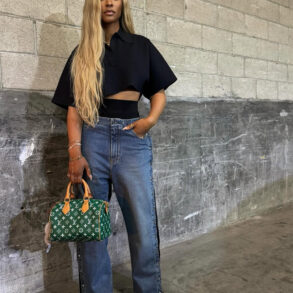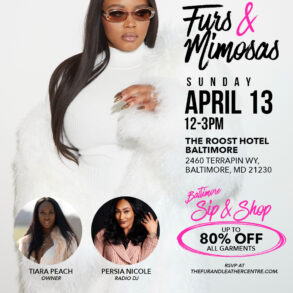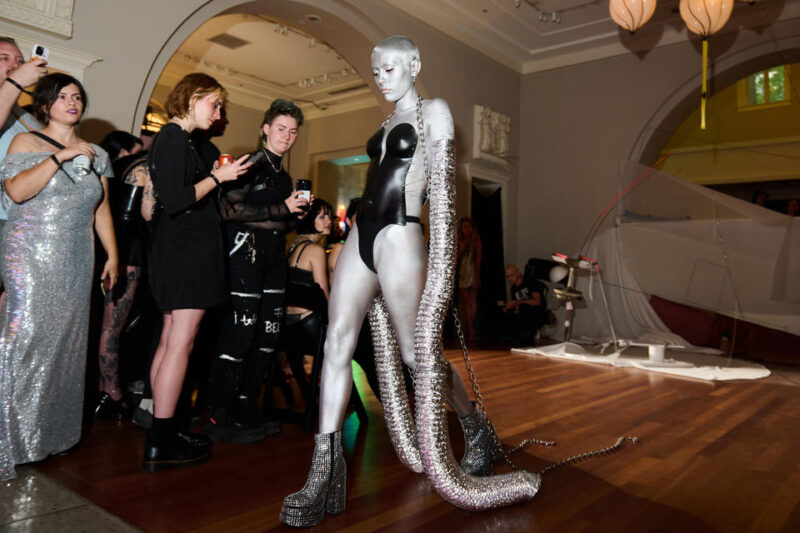
Models walk in dan mcLean’s show Runway 7:20 at XO. (Chona Kasinger for Crosscut)
An artistically revamped space that previously housed a retail clothing chain is perhaps the perfect setting for mcLean’s sustainability-minded garments. From reworking donated apparel to stitching luxury labels onto thrifted finds, mcLean’s slow, small-scale approach to design is diametrically opposed to the fast fashion industry.
“Sustainable” for this designer doesn’t strictly mean “organic” or “green,” but involves refashioning fabric already out twisting the world. Sourcing from thrift stores, donated clothes and reused material shop Seattle ReCreative, mcLean takes garments apart and puts them back together in inventive ways.
“There’s so much fashion, so many clothes, and it all gets dumped into the landfill,” she says. “There are enough clothes.”
Over the past couple of years, that ethos, along with her inclusive size range, has garnered her a devoted fanbase in the city. Go to any cool art opening and you’re bound to spot someone sporting one of her bootleg Prada necklaces or reworked denim pieces.
Born and raised in Tacoma, mcLean, 33, has always had an eye for giving new life to thrifted clothing. Growing up, she’d sift through Goodwill bins for discarded treasures to add to her closet. “When I was little, my mom would be like, ‘You can have $100 for Abercrombie or $100 for Goodwill,” she recalls. “You could get one thing [at Abercrombie] or 20 things [at Goodwill]. I wanted 20 things.”
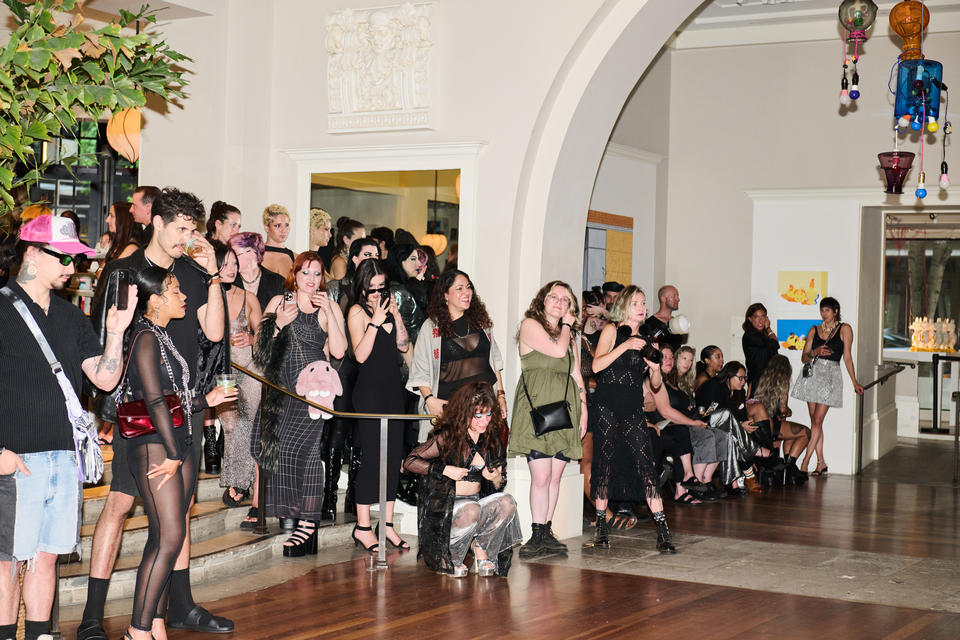
The audience watches on at the dan mcLean Runway Show 7:20 at XO. (Chona Kasinger for Crosscut)
With an interest in pursuing “green burial” methods (specifically body composting — another form of recycling), in 2017 she started environmental engineering courses at Seattle Central College. To de-stress from the intense class load, she hemmed and altered clothes with a sewing machine and sold secondhand clothes on DePop.
One day it clicked: Why keep miserably stitching together quantum physics equations when she could stitch together material and have a lot more fun? After switching to apparel design, she graduated in 2019 and started her full-fledged indie designer journey.
Now she upcycles shirts into bikinis, transforms jeans into bolero jackets, adds roses and studs to leather chaps, and makes vibrant hoodies out of scrap tie-dye fabric. Spendier than fast fashion, the price of her garments reflects their status as one-of-a-kind pieces of wearable art.
Her runway collections — which in the past have included velvet capes, Last Supper corsets, and see-through pants — are nearly entirely black, her favorite color to wear. By focusing on one color, mcLean says she can highlight the different textures of every garment so that each collection is “colorful in its own way.”
For the 7:20:XO color palette, mcLean stepped slightly outside of her comfort zone, incorporating silver to exude a galactic vibe.
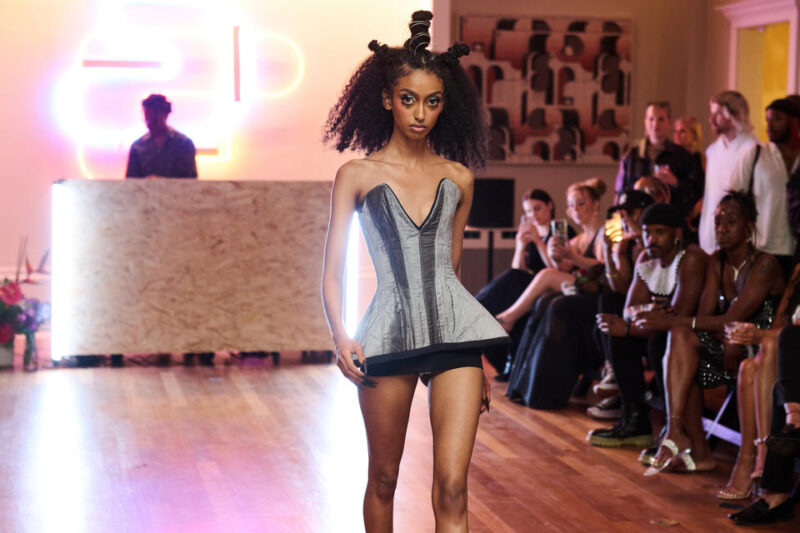
Models walk in dan mcLean’s show Runway 7:20 at XO. (Chona Kasinger for Crosscut)
Her approach is based in her long history of thrifting, but also in Seattle’s vibrant sustainable-clothing scene. Brands like Girlfriend Collective and Prairie Underground, vintage stores like Indian Summer and Bon Voyage, and designers like Janelle Abbott are among the locals mindfully pushing the dial forward on what sustainable clothing can look like.
In mcLean’s case, that look might be anything from a bucket hat made from a Burberry scarf to patchworked hoodies to hand-dyed denim shorts.
“Seattle is going to be a big place for sustainable fashion,” mcLean declares. Despite our city getting forever blasted for being a paragon of anti-fashion, she believes our penchant for eco-conscious fashion is what makes us unique. “We don’t even second-guess being sustainable, it’s just the way we are,” she says.
Similarly, mcLean’s “bootleg” series brings DIY flair to discarded high-fashion items. She started bootlegging in high school when she flipped a thrifted Juicy Couture keychain into a necklace. Now, mcLean reworks luxury dust bags and metal label emblems from houses like Louis Vuitton, Fendi, Prada and Gucci into necklaces, underwear, bikinis and earrings.
It’s a practice distinct from duping or knocking off a luxury brand — one closer to “fan art,” mcLean says. Drawing from the long tradition of streetwear-turned-luxury designer Dapper Dan (“My biggest bootleg idol,” says this dan), whose unsanctioned flips of Gucci and Louis Vuitton prints launched him to fame, mcLean sees her remixed items as a tip of the hat to luxury brands.
“It’s not ripping off somebody’s design, but more like, I respect you and I see you and I see that you do these cool things and I wanna be like you but I don’t wanna be you,” explains mcLean. (Her website includes a lengthy disclaimer stating all her designs are “repurposed, re-worked, or pre-owned.”)
“I have friends that have hit me up from Louis Vuitton, [saying], ‘Hey, just so you know, our big boss came in last week and they want one of your necklaces.’” The big brands understand “I’m not their competition,” she says.
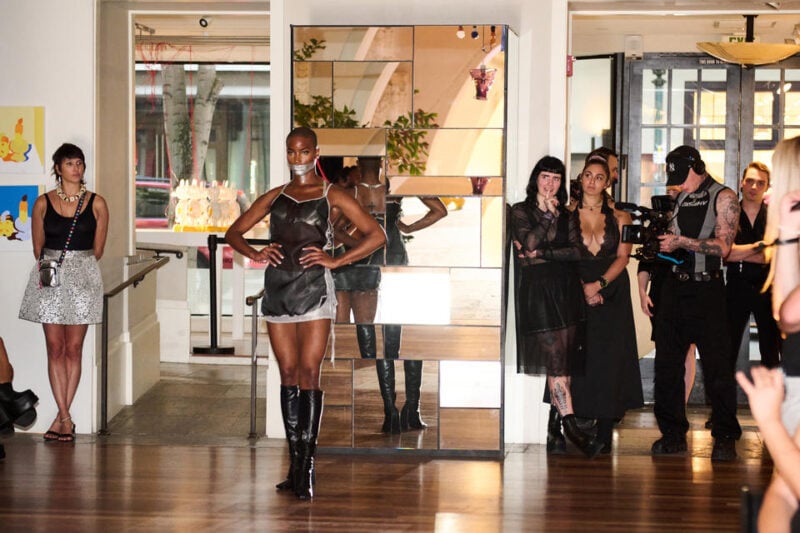
Models walk in dan mcLean’s show Runway 7:20 at XO. (Chona Kasinger for Crosscut)
In the fashion industry, corporate behemoths can crank out trendy clothes fast and cheaply, in many cases due to questionable working conditions. Mass-produced apparel items may be blatant copies of designs by small independent shops like mcLean’s, or cribbed from organic street styles.
While mcLean creates one-of-a-kind homages using labels from high-fashion garments, she would never be OK with the big suits taking her ideas. It’s all about the balance of power. Which is why she’s more than happy to teach a friend, fan or fellow designer how to make their own versions of mcLean originals using secondhand materials.
For her shows, mcLean relies on a panel to help cast models of varying backgrounds. She considers her models her muses; instead of choosing them to fit her garments, each garment is crafted to fit a specific model. Once selected, mcLean hangs out with them, deep-dives into their Instagram feeds, and crafts her pieces based on their personalities. The result is distinct items that reflect the wearer and bring different fashion sensibilities to the fore.
“The great thing about dan is that she doesn’t believe … that people should fit clothes, but that clothes should fit people and who they are,” says Vivian Frieson, an entrepreneur who has walked the catwalk for mcLean and who served on the casting panel for the XO23 show.
“I’m a masculine-presenting woman,” Frieson says, “and I don’t know if there are many fashion designers that are putting masc women in the forefront, giving them a space to be able to showcase themselves in that way.”
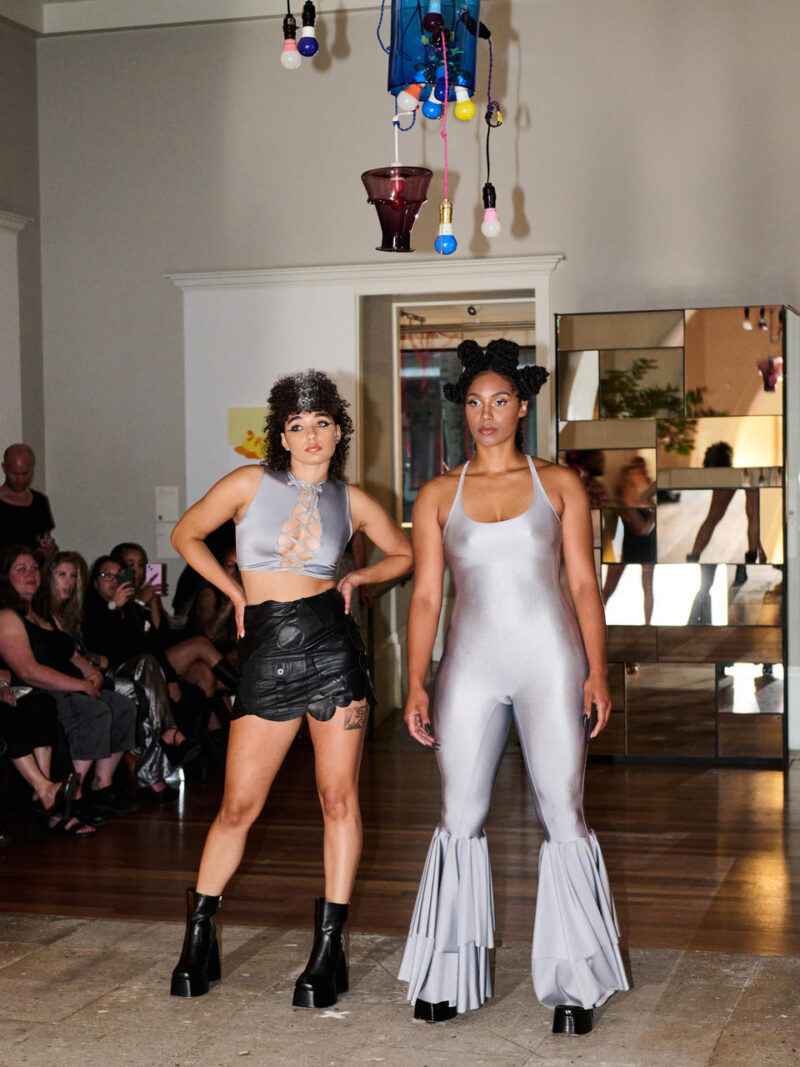
Models walk in dan mcLean’s show Runway 7:20 at XO. (Chona Kasinger for Crosscut)
Pulling inspiration from space-age 1960s designer Pierre Cardin (who died in 2020), mcLean’s 7:20:XO collection is a testament to her inclusive and sustainable creativity.
“I want to do this with a whole bunch of different bodies, a whole bunch of different genders, a whole bunch of different hairstyles,” says mcLean of the theme, noting that in the 1960s Cardin’s geometric, Star Trek-y designs were worn mostly by thin, femme white women. “I want to start taking things from the past and redoing them in a way that is more sustainable.”
During the show, eleven models demonstrated 25 Uhura-ready looks, all flavored with mcLean’s gothic sensibility. Owing to the arty environment, mcLean also went big with the designs — including one garment with slinky repurposed duct sleeves. “I want it to be avant-garde and not necessarily only wearable pieces,” she notes.
The runway zigged and zagged through the irregularly shaped space, where attendees stuffed themselves into every conceivable corner around the art installations. As models stomped down the catwalk wearing pieces like a giant hoop skirt composed of silver chains, silver thong bodysuits, and leather patchwork skirts, guests hooted and hollered in affirmation.
Finally, an exuberant mcLean walked down the runway with her partner, Sharnae Corrin, waving at friends and supporters amid a round of applause.
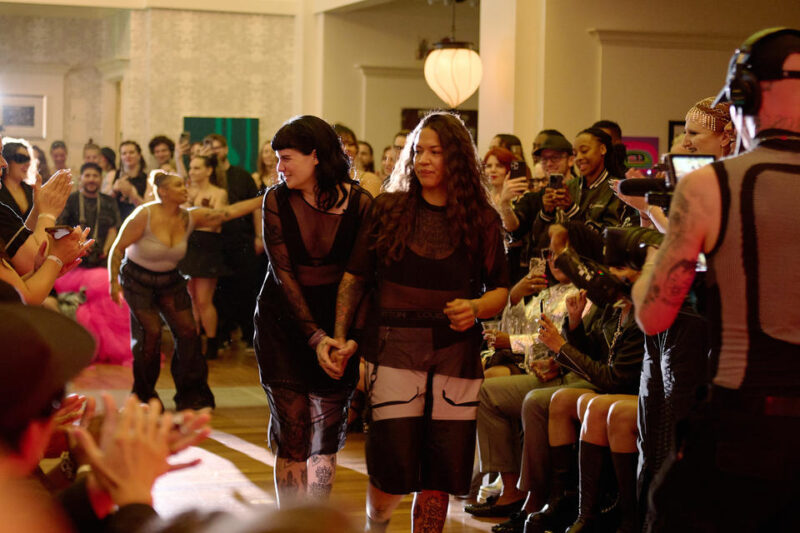
The audience applauds dan mcLean, center left, as she stands with her partner Sharnae Corrin after the Runway 7:20 fashion show at XO. (Chona Kasinger for Crosscut)
As the runway cleared, the surrounding group of spiffed up Seattleites danced, snapped more photos and swarmed the designer with praise. For mcLean, such interest and enthusiasm encourages her to continue on her path — and urge other budding designers to follow suit.
“Modeling agencies around here are like, ‘The idea is cool but is it doable on a big scale?’” mcLean says. Her answer is no. “Because I don’t want to do it on a big scale,” she says. “I want to preach that small designers around here should do more [fashion shows] like this because you can live off of it and you can bring arts into the city.”
Photo credit: Seattle designer dan mcLean prioritizes sustainability with apparel made from previously owned clothing. Here, she pauses during her runway show “7:20:XO” on July 21, 2023. (Chona Kasinger for Crosscut)
This post was originally published on this site be sure to check out more of their content.

